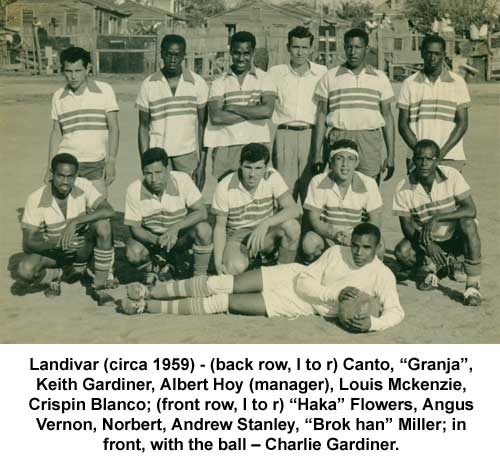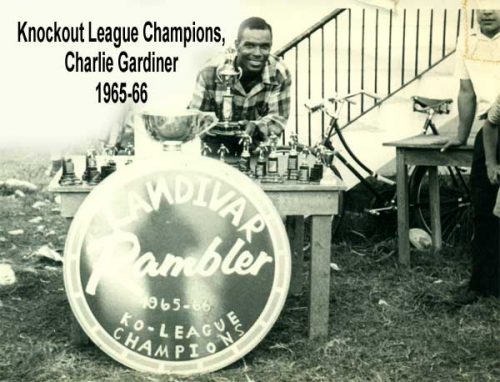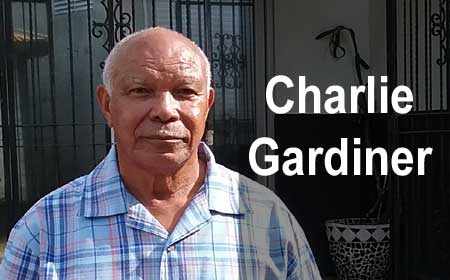He’s 79 now, and one of his knees isn’t working all that well, but he still looks spry enough to take off and push one out of the farthest corner, or slam a C. F. S. Brown fastball over the boundary for six. In 1950’s/1960’s Belize, everyone knew Charlie Gardiner’s name. He was a top football player. And he had some brilliant days on the cricket pitch too. He had to excel. Athletics is written all over his genes.
His dad, Robert Gardiner, was among that famous group of Belizeans (British Hondurans) who boarded steamships in Belize and journeyed across the ocean to fight for Britain in the First World War. Robert won a silver cup in Mesopotamia for gaining the most points in a sporting competition for soldiers stationed over there. (Charlie says he still has the cup) His brother, Keith, was an All Belize footballer in the 1960’s, a first class cricketer, and a national table tennis champion. His brother, Roy, was a highly respected boxer.
The athletic excellence doesn’t stop there. Two of his and his wife’s (Sonia Franklin) three children achieved All American honors in their soccer league. His nephew, Stanley, was the sweeper for Municipal in Guatemala (1980’s), and represented that country in international competitions. His grandnephew, Denmark Casey Jr., rules the midfield for Belize’s national champions – the Belmopan Bandits.
Charlie Gardiner faced a major challenge in his youth: his father died when he was just eight years old. His family didn’t have any money to send him to high school so as a boy he entered the world of work, as a carpenter. There’s no mediocrity in the man. He became an outstanding carpenter and cabinet maker.

Charlie’s exploits on the football field began at age 15, when he joined MYA, as their goalkeeper and right wing. I was very worried about going into goal against the big boys, he says. I was especially worried about facing Waako Kuylen. The legend around was that a goalkeeper put his hand in the path of one of his powerful shots, and the doctor at the hospital had to set his hand in Plaster of Paris. Chester (can’t remember his last name) was another fearsome guy too.
Our team didn’t do too well, he said. But I had a big moment. Unknown was one point behind Preston; it was the last game of the season and they needed a win against us to secure the title. In the waning moments I got away inside the “eighteen” and put one by their All Belize goalkeeper, Frank Lightburn. We won 1-0. After that year I joined Excelsior, and then I went on to play with Landivar, where I spent most of my career as their goalkeeper. We won a few titles.
I only played one international match for Belize, he said. We played against the sailors from off a British ship. They gave us some little flags, mementos, before the game. We had nothing to give them. So some of us got together and we decided to ask the committee to provide a little something that we could share the next time we played a foreign team. The committee members went on the radio and scandalized me and Rafael Aguet; they accused us of asking for money to play for the national team. I didn’t want to play for them after that.
I played for Landivar in Guatemala City. That year we were sponsored by the Guatemalan Consulate in Belize. The way that happened, our coach, B-lisle (Louis Belisle), and some of the older players, quarreled, and B-lisle got up and left the team. Albert Hoy was a big fan of our Club. He said he didn’t want the team to fall apart, so he, and one of our players who worked at the Guatemalan Consulate, went to them and they gave us our uniforms and socks and boots. A couple years after that Salvador Habet took over sponsorship of the Club.
Like most goalkeepers, Charlie Gardiner’s got a little disdain for strikers. Maya (Ortega) was a very good player, he said. But I always knew where he would shoot the ball. One game I stopped him from the penalty spot too.
D- Line (Daniel Lino) was very good too, he said. But I only played against him once. No, he didn’t score. I understand he improved his game a lot after I left.
Of course Amandala wanted to know about his encounters with the Mighty Mugga (Louis Garbutt). I met him in New York. He came up to me and said, “You’re the only goalkeeper I couldn’t score on.” I remember one time Di Mugga got an open break on me. He had a big shot, but he didn’t hit the ball right. The ball just dribbled into my arms. After the game his teammates asked him what happened—why “ih ups.”
We asked Charlie Gardiner about his exploits on the cricket field. I wasn’t into too much cricket when I was a boy, he said. I only played “tip and go” (“bat an rikits”). But his brother, Keith, and a couple of his Landivar friends were on Unity, so he joined the team. I won two titles with Unity, he told us.

When Charlie Gardiner joined Unity, he was playing alongside a number of guys who were ten, fifteen years his senior. In those days a youth didn’t get anywhere if he didn’t respect his elders. Naturally, he had to yield to the judgment of the veterans on the Club.
He said he became a good batsman after some advice from his captain, Buck Belisle. One game, when we faced Sussex and the legendary C. F. S. Brown, Buck told me to look for his wide pitch, and belt it. But before I went in to bat, Telford Vernon advised me to lay off that pitch. I only scored 12 runs. Buck came up to me after the game and asked why I made such a poor showing. I told him that Telford advised me to let the pitch on the offside go by. “Next time, listen to Telford,” he said Buck told him. “And then go and do what you want. If you make duck, I satisfy. Bat how yu want.”
I remember Rovers had Unity six for six one day, he said, when me and Telford went to bat. I had the flu but that day I had my best innings – 65 runs.
At the height of his sports career, Charlie Gardiner left Belize for the USA. He said he packed up and left in 1967 because of the politics. He is apolitical, unlike his older brother, George “Bolo” Gardiner, who ran for the PUP in the first big (universal adult suffrage) elections in 1954, in the Toledo District. So, how does a man who keeps his nose to himself get hit by the slings and arrows crisscrossing the political arena, we asked. My brother, Walter, heckled George Price, he told us, and they fired him from his job at the Belize Electricity Board. My sister, Dorothy, was a nurse at the Belize Hospital. She was forced to resign from her job. I didn’t wait for them to come for me. I packed my bags and headed for the USA. I knew I wasn’t leaving forever; I always had it in my mind to retire in my home country.
In the USA, Charlie used his professional skills in woodworking to make a successful business. He also found the time to complete his high school education. A little more than a decade ago he returned to the land of his birth. Presently he and his wife live near Rockville, on the George Price Highway.
Charlie Gardiner is a full retiree now. He looks way too full of vigor to spend all his time in his hammock. No teaching, no sharing with the young people, we wanted to know. I think I’m too strict to work with them, he said. He does have advice for our young footballers, though. Be dedicated to the sport, he said. Have discipline. And aspire to be the best in the world.
It’s a little early for this, we said, but if your epitaph spoke of your time on the sports fields of Belize, what would you want it to say? He didn’t disappoint. I would like it to say that I was the best goalkeeper, he said.

